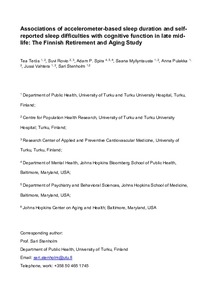Associations of accelerometer-based sleep duration and self-reported sleep difficulties with cognitive function in late mid-life: The Finnish Retirement and Aging Study
Rovio Suvi; Spira Adam P; Vahtera Jussi; Pulakka Anna; Teräs Tea; Myllyntausta Saana; Stenholm Sari
https://urn.fi/URN:NBN:fi-fe2021042827085
Tiivistelmä
Objectives
Prior evidence suggests that sleep duration and sleep difficulties may be associated with cognitive function in old age, but little is known about the sleep–cognition association in late mid-life. Our aim was to examine the associations of accelerometer-based sleep duration as well as subjective sleep difficulties with different domains of cognitive function among aging workers.
Methods
The study population consisted of 289 participants (mean age 62.4 years, SD 1.02; 83% women) from the Finnish Retirement and Aging Study (FIREA). Sleep difficulties were measured using Jenkins Sleep Problem Scale (difficulties falling asleep, difficulties maintaining sleep, waking up too early in the morning, and nonrestorative sleep). Sleep duration was measured with wrist-worn accelerometer and self-report, and participants were divided into short (<7 h/night), mid-range (7–9 h/night) and long (≥9 h/night) sleepers. Participants underwent extensive cognitive testing covering three domains: (1) memory, (2) executive function, and (3) attention and information processing.
Results
Greater difficulties in waking up too early in the morning were associated with poorer executive function measured with Spatial Working Memory (SWM) test (p = 0.005). Additionally, nonrestorative sleep was associated with poorer executive function measured with Trail Making Test, B–A, (p = 0.036) and borderline significantly with lower SWM (p = 0.056). Compared to mid-range sleepers, long sleepers tended to have poorer cognitive function (all memory function tests and SWM), but the associations were not statistically significant due to small number of long sleepers.
Conclusions
Subjective sleep difficulties may be linked to poorer executive function in a relatively healthy population of older workers in their 60 s. Thus, promoting good sleep quality may translate into better cognitive health in late mid-life.
Kokoelmat
- Rinnakkaistallenteet [19218]
